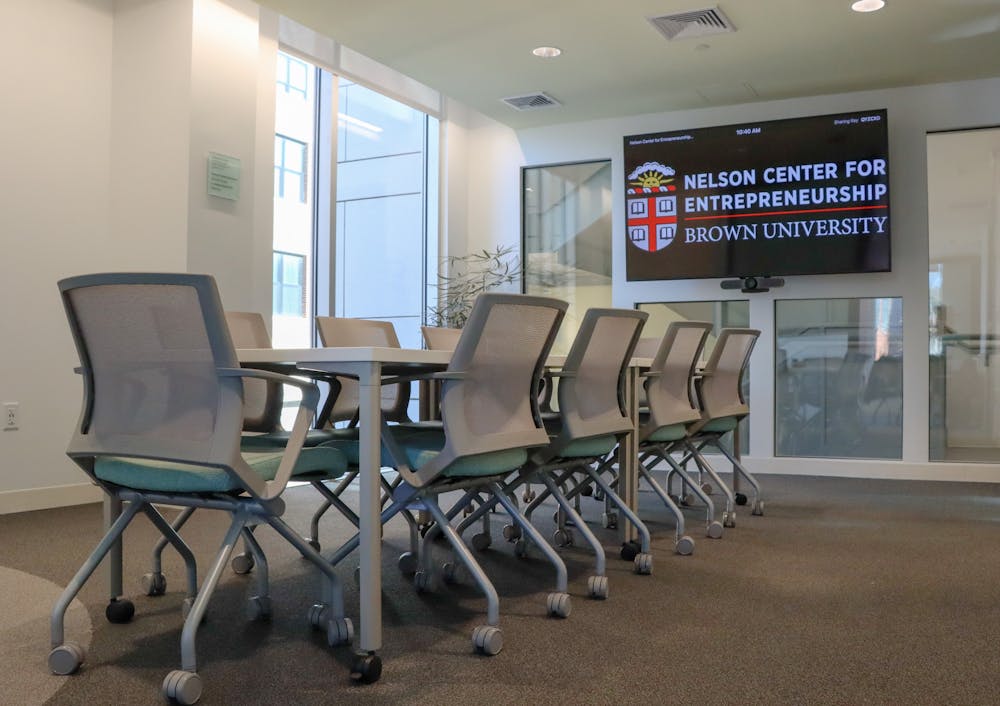On Thursday evening, the seven finalist teams in the 2022 Brown Venture Prize gathered in Alumnae Hall to pitch their ideas to a panel of judges for a chance to win $50,000 in prizes. The Brown Venture Prize aims to “empower the most advanced entrepreneurial ventures by Brown students,” according to the competition’s website.
The first-place prize of $25,000 was awarded to AtomICs, a startup employing molecules to store data and perform computations led by Dana Biechele-Speziale GS, Selahaddin Gumus GS, Assistant Professor of Chemistry Brenda Rubenstein ’07 and Associate Professor of Engineering Jacob Rosenstein ’05.
Dream!N, an online gaming and socializing platform, won the second-place prize of $15,000, and COmmunity ADherence, a digital healthcare platform that links a smart pillbox to a mobile app and notifies users to take their medicine, won the third-place prize of $10,000. Cinemates, a platform providing community-based movie and television recommendations, was voted the fan favorite venture by audience members.
Teams were assessed based on their “potential to create ‘impact at scale’” by nine Brown alumni who have “founded and led companies across many sectors and scaled their ventures to valuations in the billions affecting millions of people worldwide,” an advertisement for the event read.
The teams behind the three winning ventures also gained access to an extensive network of mentorship and support, as well as a free trip to New York City to meet with business founders, venture capitalists and other entrepreneurs, according to the prize’s website.
After brief opening remarks from Executive Director of the Nelson Center for Entrepreneurship Danny Warshay ’87, each of the seven teams pitched their ventures for four minutes and answered questions from the judges. Following the pitches, the judges deliberated and selected the three prize winners.
The Herald spoke to members of the winning teams after the event.
“I’m so excited (to win the prize),” said Yifei Wang ’23, who presented Dream!N on behalf of his team. We practiced “hundreds of times” prior to presenting our venture, and we “learned a lot” too, from becoming “more clear about what (our team wants) to do” to how we “conduct our product.”
Rose Engler ’22, a leader of COAD, said she was “super proud of (her) team and everything (they had) accomplished,” noting that her team’s business “started only six months ago.” By participating in this competition, Engler said that she realized the importance of “just going for it.”
Though the five remaining teams did not win any prizes, members of these teams were still pleased with their overall experience as finalists.
Maggie Bachenberg ’22 and Trisha Ballakur ’22, the team behind Pointz Mobility, Inc., an app which maps safer biking and scooter routes, shared how “happy” they were to be “part of the event and (to) take the time to showcase our work and see everybody else’s work.”
In particular, Ballakur, who performs a lot of “technical” work as a computer science concentrator, loved the opportunity “to practice (her) confidence” and “speaking skills.”
The event — the first in-person Brown Venture Prize Night in two years — drew many excited students, staff and community members.
Alexander Margulis, chief operating officer of Mansfield Bio-Incubator, a Massachusetts-based company providing lab space, connections and resources to biotech startups, came to the pitch prize night to “network with labs and startups.”
“Brown is a key part of the entrepreneurial ecosystem in the region, and I’d like to be part of it,” he said.
Rui Pu GS and Vanessa Garcia GS, master’s students in the School of Engineering’s Program in Innovation and Entrepreneurship, attended the event on their professor’s recommendation.
In addition, they wanted to “see how people pitch their ideas in real life” and “learn how (the founders of these ventures) found their current co-founders,” said Pu.
Many of the teams hope that the pitch night will only be the beginning of growth for their ventures. “We're really grateful for this opportunity, and we're going to be doing this full time,” Bachenberg said. “We are not going anywhere.”





